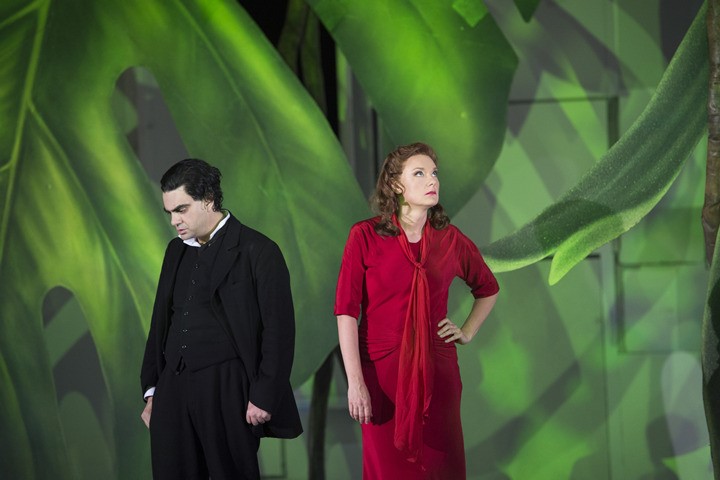 Germany Martinů, Juliette: Staatskapelle Berlin, Staatsopernchor, Daniel Barenboim (conductor), Schiller Theatre, Berlin, 14.6.2016. (JMI)
Germany Martinů, Juliette: Staatskapelle Berlin, Staatsopernchor, Daniel Barenboim (conductor), Schiller Theatre, Berlin, 14.6.2016. (JMI)

New Production:
Direction: Claus Guth
Sets: Alfred Peter
Costumes: Eva Dessecker
Lighting: Olaf Freese
Cast:
Juliette: Magdalena Kožená
Michel: Rolando Villazón
Commisioner and others: Richard Croft
Young Arab: Thomas Lichtenecker
Old Arab: Wolfgang Schöne
One of the high points of the Berlin season is this new production of a little-known opera by Bohuslav Martinu. It has enjoyed a great success, particularly with regard to the music and the staging.
Bohuslav Martinů (1890-1959) was a prolific composer who produced his major works in the years following World War I. He travelled to France in 1924 with aid from the Czech government and settled in Paris, but he was forced to flee after the 1941 German invasion because of his contacts with the Czech resistance. He settled in the United States and then returned to Europe after the war ended, and died in Switzerland. Among his compositions are a number of operas; they are seldom performed today, although in recent years it has not been uncommon to see The Greek Passion and Juliette done by important companies. Coincidentally, a few days ago the Guildhall School in London mounted two other Martinů operas, Ariane and Alexandre Bis.
Juliette is not a completely unknown opera: in recent years there have been performances in Frankfurt, Zurich, London, Geneva and Bremen. It is based on a play by French author Georges Neveux, who was active in surrealist theatre in the 1930s. The plot revolves around the character of Michel who is obsessed with Juliette and continuously mixes up reality, memories, desires and dreams ̶ and it is accompanied by a very attractive score. The libretto was originally written in French, but was first performed in Prague in 1938 in a Czech translation; the version presented here uses the original French text.
As can be deduced from the opera’s plot, it is not an easy work to stage. Claus Guth’s production is spectacular, one of the best stage works I’ve seen in many years. In the first two acts, the set is an enclosed white cube. By adding a few large plants to the middle of the stage in Act II, it becomes the forest where the protagonists meet. Act III presents a dark and empty space, very foggy, where the characters wander about. The costumes date from the time of the composition and are appropriate. I must emphasize the outstanding lighting work which was truly spectacular in the last act.
Claus Guth’s direction is outstanding throughout the opera, and in particular his exceptional collaboration with Rolando Villazón. This is a work of theatrical genius, an example of what can be done with imagination, good taste and respect for libretto and music.
I have no doubt that the programming of this Martinů opera had much to do with the presence of Daniel Barenboim at the Staatsoper. It is not exactly an easy opera to conduct, but the music here was splendid. In other hands the result might be very different, but Barenboim gave a magnificent reading of the opera from beginning to end, with the collaboration of the always exceptional Staatskapelle Berlin, and of the Staatsopernchor.
Although Juliette is the title character, the real protagonist is Michel, the neurotic and disoriented bookseller, who is on stage from beginning to end and has to sing or recite the entire time. He was interpreted by Rolando Villazón, and it is no exaggeration to say that he is absolutely irreplaceable in the character. He’s not as strong as he once was in vocal terms, whether it’s a question of volume, projection or tessitura. However, he has not lost one iota of his skill as an actor and has an enormous capacity to transmit emotion to the audience. The role lies very much in the middle register which allowed him to manage the score, and he gave an unforgettable performance.
Juliette was played by Czech mezzo soprano Magdalena Kožená who did very well in the part. She has an attractive, well-managed voice, and is a strong interpreter on stage.
The other characters are secondary, and in many cases the singers perform several roles. All were nicely handled.
Tenor Richard Croft was successful in the roles of Commissioner and Postman, and also as Officer of the Central Office of Dreams in the last act. Countertenor Thomas Lichtenecker won the audience’s sympathy with his interpretation of the Young Arab. Veteran Wolfgang Schöne served well as the Old Arab and in other small characters. Elsa Dreisig and Adriane Queiroz were pleasing in their episodic interventions, and the same can be said of basses Arttu Kataja and Jan Martinik in their different characters. Florian Hoffmann was the train driver in Act III.
José M. Irurzun
